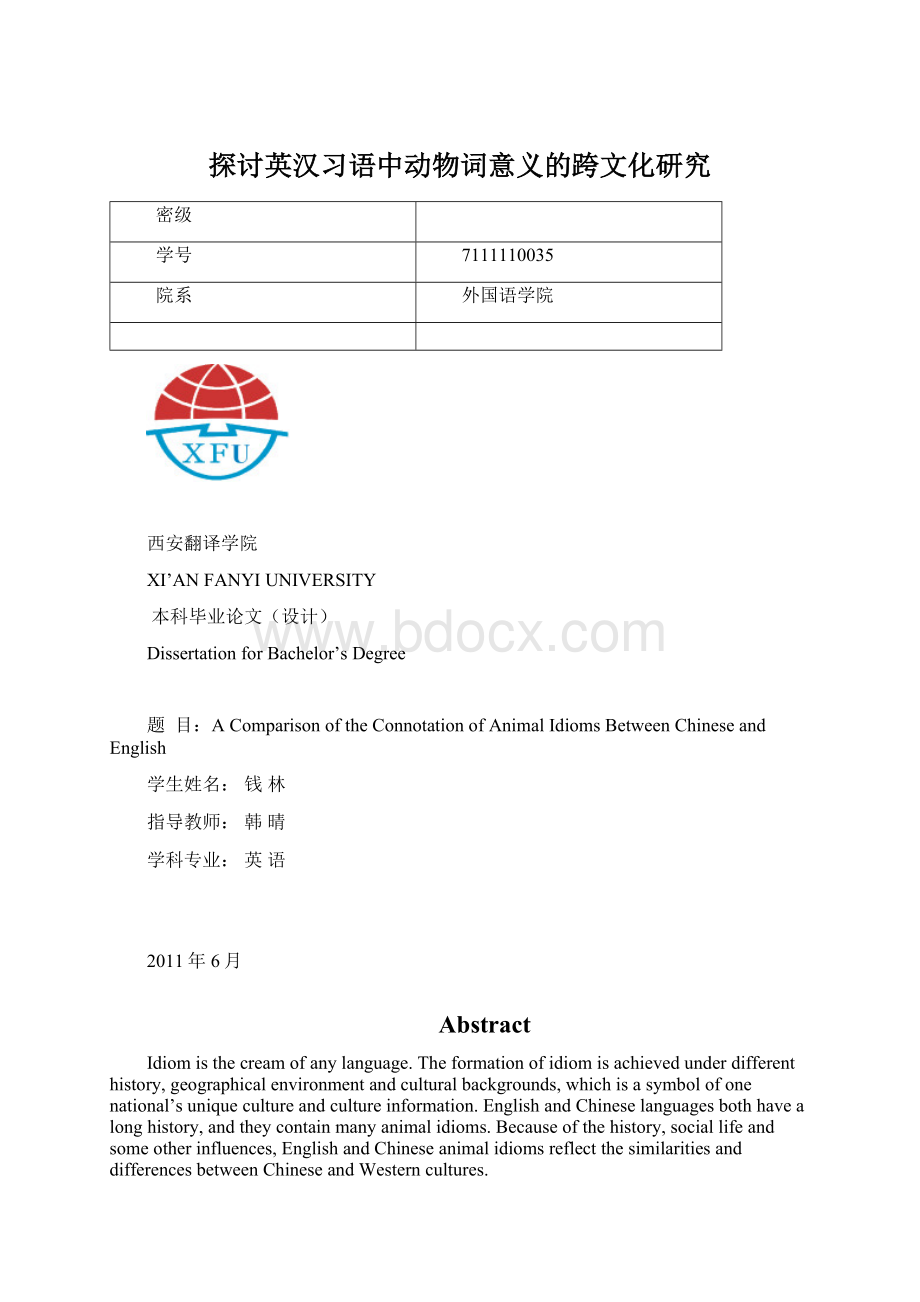探讨英汉习语中动物词意义的跨文化研究Word格式.docx
《探讨英汉习语中动物词意义的跨文化研究Word格式.docx》由会员分享,可在线阅读,更多相关《探讨英汉习语中动物词意义的跨文化研究Word格式.docx(12页珍藏版)》请在冰豆网上搜索。

XI’ANFANYIUNIVERSITY
本科毕业论文(设计)
DissertationforBachelor’sDegree
题目:
AComparisonoftheConnotationofAnimalIdiomsBetweenChineseandEnglish
学生姓名:
钱林
指导教师:
韩晴
学科专业:
英语
2011年6月
Abstract
Idiomisthecreamofanylanguage.Theformationofidiomisachievedunderdifferenthistory,geographicalenvironmentandculturalbackgrounds,whichisasymbolofonenational’suniquecultureandcultureinformation.EnglishandChineselanguagesbothhavealonghistory,andtheycontainmanyanimalidioms.Becauseofthehistory,sociallifeandsomeotherinfluences,EnglishandChineseanimalidiomsreflectthesimilaritiesanddifferencesbetweenChineseandWesterncultures.
Manyscholarsandlinguistsathomeandabroadhavedoneresearchesaboutidioms.ProfessorDengYanchang(2003)madeacontrastivestudyofEnglishandChineselanguageculturesfromanimalidioms.Theresearchofanimalidiomslaidafoundationresearchesonidiomslateron.ThisthesisstartsitsdiscussionfromanimalidiomstoshowthedifferencesbetweenChineseandWesternculturebycontrastingthedifferentconnotationindifferentareas.Togetpeopletoknowthefunctionthatanimalidiomsareusedinmulti-culturalcommunication,canmakepeopleuseitproficiently.
KeyWords:
animalidiom,culturaldifference,reason
摘要
习语在任何语言中都是精华。
它是在不同的历史,地理环境和文化背景下形成的;
承载着一定的民族文化特色和文化信息。
英汉两种语言历史悠久,包含着大量的动物习语,由于历史,社会生活等方面因素的影响,英汉动物习语体现了中西文化的相同和差异。
动物词汇作为语言的一个重要组成部分与文化也有着密切的联系。
习语正像一面镜子,透过它可以看到色彩斑斓的民族文化,更可以体验到一种语言与另一种语言的最显著的差别。
这些动物习语的产生和民族文化紧密相连,而每个民族的文化背景、生活环境、风俗习惯、历史传统、思维方式、道德观念、宗教信仰等等都有自己独特之处,所以大量的以动物为喻体的习语反映出了汉英两种语言丰富的文化内涵。
从社会语言学和认知语言学角度来分析动物习语所承载的不同文化内涵,可以了解更多异国文化,增加学习语言的兴趣,从而可以更好地理解和运用语言。
本论文就英汉动物习语进行研究与探讨,能让我们掌握更丰富的语言文化知识,深入了解英汉的文化传统和风俗习惯的统一性和差异性,才能真正的学好英语并成功的进行跨文化交际。
不同国家和民族,虽然生活方式、文化背景不同,但由于某些动物的共同体形特征、生活特征或行为习性,人们在表达某一语义时,两种语言会借用同一动物名称,在英汉语言中的确存在这些在语义表达和文化内涵上具有对等性的动物词语,他们有着同样的比喻、象征和联想意义。
关键词:
动物习语;
文化差异;
原因
Contents
Abstracti
Abstractinchineseiiii
1.Introduction1
2.ABriefReviewofAnimalIdioms3
2.1DefinitionandFeaturesofAnimalIdioms3
2.2RelationshipBetweenCultureandAnimalIdioms4
2.3Culturalmeaningsofanimals4
2.3.1AnimalswithSimilarCulturalMeanings4
2.3.2AnimalswithDifferentCulturalMeanings7
2.3.3DifferentAnimalswithSimilarCulturalMeanings7
3.CulturalDifferencesBetweenEnglishandChinesefromAnimalIdioms9
3.1DogandGou9
3.2DragonandLong10
3.3BatandBianfu11
3.4PeacockandKongque11
4ReasonfortheDifferencesBetweenEnglishandChineseAnimalIdioms13
4.1DifferentSocialConvention13
4.2DifferentLivingEnvironments14
5.Conclusion16
Acknowledgement17
WorksCited18
1.Introduction
Nowadays,withtheeconomicglobalizationandtheregionaleconomicintegrationstrengthening,theculturalexchangesbetweenChinaandtheWesthavebecomemoreandmoreimportant.TransmissionandapplicationinEnglishisusedwidely,sounderstandingthedifferencesbetweenChineseandWesterncultureisimperative.However,thesocialdevelopmentisreflectedinthelanguage.
Withoutidioms,ourlanguagewouldbecomedullanddry,whereasanappropriateuseoftheminourspeechandwritingwilladdtothestrengthandvividnessofourlanguage.Andtheidiomcanbetterreflecttheculturalcharacteristicsandconnotation.Idiomsarefixedanduniqueexpression,whichareformedintheprocessofusingalanguage.Idiomsarethesedimentofthehistoryandculture,theessencesofculturederivedfromtheprocessofrecognizingandtransformingthenature,thesubstantialcorpusofinformation,andavividreflectionofnationalculture.BothEnglishandChineselanguageshavealonghistory,andtheycontainmanyidiomswhichareimplicitly,humorous,serious,elegant,conciseandvividimage.Theseidiomsarecloselylinkedwiththeculturaltraditions,whichreflecttheculturalcharacteristicsandculturalinformationofthenation.Therefore,theidiomsofEnglishandChinese,especiallytheanimalidioms,reflectsharpdifferencesofnationalculture.Deeplyunderstandinganimalidiomsmakescross-culturalcommunicationgosmoothly.
Animalidiomshavebeenemphasizedandstudiedathomeandabroad.Athome,YuFumin(1996)madestrenuousandsuccessfuleffortsincomparingEnglishandChineseidiomstoillustratetheauthor’spertinentpoints.ChenDezhang(1999)hadaresearchofculturalconnotationofanimalwordsinEnglishandChineseandfindoutwhatimagespeoplehaveover30commonanimals.JiangLei(2000)analysedanimalidiomsandmadeasurveyofcontrastivestudiesofEnglishandChineseidioms,whichshowthenation’slonghistoryandculturalcharacter.Therearealsooverseaslinguistswhohavedoneresearchesofidioms.Strassler(2004)madeapragmaticanalysisonEnglishidiomsandcreatedapragmaticmodelforEnglishidiomsandtoprovideabasisforatheoryofidiomsasaphenomenonofnaturallanguage.(ChangChenguang,2004:
36)
AcontrastivemethodwillbetakentoanalyzethedifferenceofanimalidiomsbetweenEnglishandChinesetohelppeoplehaveagoodunderstandingofthedifferentcultures.Itcontainsfiveparts.Introduction,thefirstpart,statesthesignificance,method,frameworkandmodernresearchesofthethesis.Thesecondpartofthisthesisisabriefreviewofanimalidiomssuchasdefinition,features,therelationshipbetweencultureandanimalidioms.CulturaldifferencesbetweenEnglishandChinesefromanimalidiomsareillustratedinthethirdpart.ThefourthpartofthisthesisliststhereasonsforthedifferencesbetweenEnglishandChineseanimalidioms.Thelastpartisasummaryofthewholepaper.
2.ABriefReviewofAnimalIdioms
2.1DefinitionandFeaturesofAnimalIdioms
Animalidiom,justasitsnameimplies,isonetypeofidiomswhicharecombinedbyanimalwords,thereforeitisessentialtodefineidiomfirstofall.
Idiomisaphraseorsentencewhosemeaningisnotclearfromthemeaningofitsindividualandwhichmustbelearntasawholeunit,inOxfordAdvancedLearner’sEnglish-ChineseDictionary.
Idiomsarefixedphrasesorshortsentencesderivedfromalong-termuseoflanguage.“Itcontainsawealthofculturalinformation,culturalcharacteristicsandculturalbackground.Ithasadistinctiveimageandmetaphor,showingthedistinctivenationalcharacteristicsandgeographicalcolor.”(Bao.2001:
148)
ThefixedphrasesorsentencesinEnglishandChinesearecalled“idiom”,andcanalsobeinterpretedas“setphrase”.“Idioms,fixedintheirstructure,havebeenusedforexpressingthefullmeaningforalongtime.Suchphrasesorshortsentencesaregraduallyformedinthedevelopmentofthelanguage,sotheycannotbeopenedorre-combined.”(Jiang.2000:
49)
Lastbutnotleast,idiommeansanacceptedphrase,construction,orexpressioncontrarytotheusualpatternsofthelanguageorhavingameaningdifferentfromthelanguageorhavingameaningdifferentfromtheliteral,writteninWebster’sNewWorldDictionaryoftheAmericanLanguage.
TheChineseequivalentfor“idiom”is熟语(shú
yǔ).Itmeansakindofsetphraseorsentence,which,likeastockexpression,isoftenquotedbythecommonpeople.(Yu,Guo,1999:
8)
Englishidioms,inabroadsense,includeidiomaticphrases,proverbialsayingsandanumberofslangexpressions.WhereasChineseidiomscanberoughlydividedinto:
setphrases(成语),commonsayings(俗语),proverbs(谚语),atwo-partallegoricalsayings(歇后语),andsomevulgarexpressions(粗俗语).
Asaparticularlinguisticunit,idiomshowsitsownspecificcharacteristics.Firstly,idiomsareusuallyforceful,concise,vividandcomprehensive,andsomeidiomssuchasanimalidioms,oftencontainimagesandfiguresofspeech,sotheyhaveacquiredafigurativemeaning.Theyconveymoremeaningsasawholethanthefewwordscouldcarryseparately.Secondly,manyidiomsdonotfollowanystandardrules,fortheyoftenviolateconventionalgrammaticalrules,andsometimesarewronginlogic.Theyseemarbitraryanditcannotbeexplainedhoworwhyaparticularidiomaticphrasehasassumesitspresentform.
TheyarethebriefstatementofEnglishandChineseidioms.Knowingthedefinitionsandfeaturesofidiomswillhelppeopleunderstandtheirculturesbetter.
2.2RelationshipBetweenCultureandAnimalIdioms
Animalsarefriendsofhumanbeings.Languagesofallnationscontainalotofwordsdenotinganimals,andsodoChineseandEnglish.Withthedevelopmentandprogressofhumansociety,manyanimalsweretamedtobecomedomesticonesservingpeople,andmanyothershavebecomepeople’spets.So,animalshavebecomepartofpeople’slife.Assciencedevelops,peoplelearnmoreandmoreaboutanimals.Zoologicalgardensarenownecessaryscenesinmanymajorcitiesallovertheworld.Hundredsofthousandsofbooksonanimalhavebeenpublished.EveryTVstationbroadcastsspecialprogramsaboutanimalincertainchannels.Inallthisprocess,animalwordsgraduallygottheirestablishedconnotationsinalllanguages,thatis,peopleassociatetheirfeelingsandemotions,evenhappeningsandnaturalphenomenawithvariousanimalswhicharethoughttorepresentdifferentcharacterslikepeople,orserveasomens.“Manyanimalshavebecomeakindofsymbolisminpeople’sthinkingandthissymbolismisreflectedinthelanguage.However,becauseofdifferenthistoryandculture,theconnotationsofanimalidiomsinonelanguagedonotnecessarilycoincidewiththoseinanother.So,theidiomsofanimalbestarereflectedtheculture.”(Hu.1999:
236)
2.3CulturalMeaningsofAnimals
Therearesomanykindsofanimalsinthenature,andtheyeachhavetheirownnatureandlivinghabits.Animalsaretheindispensableparto